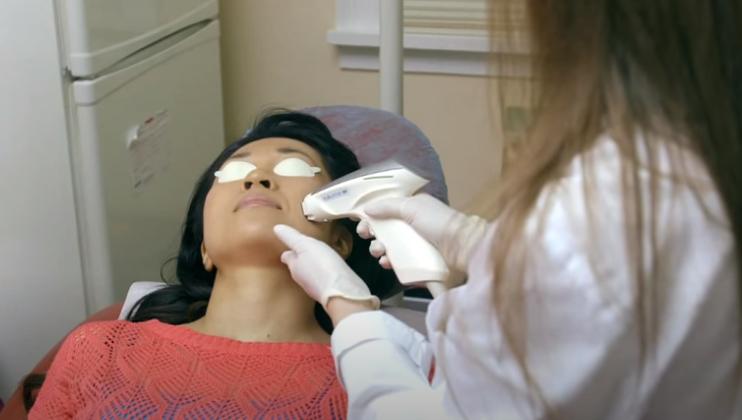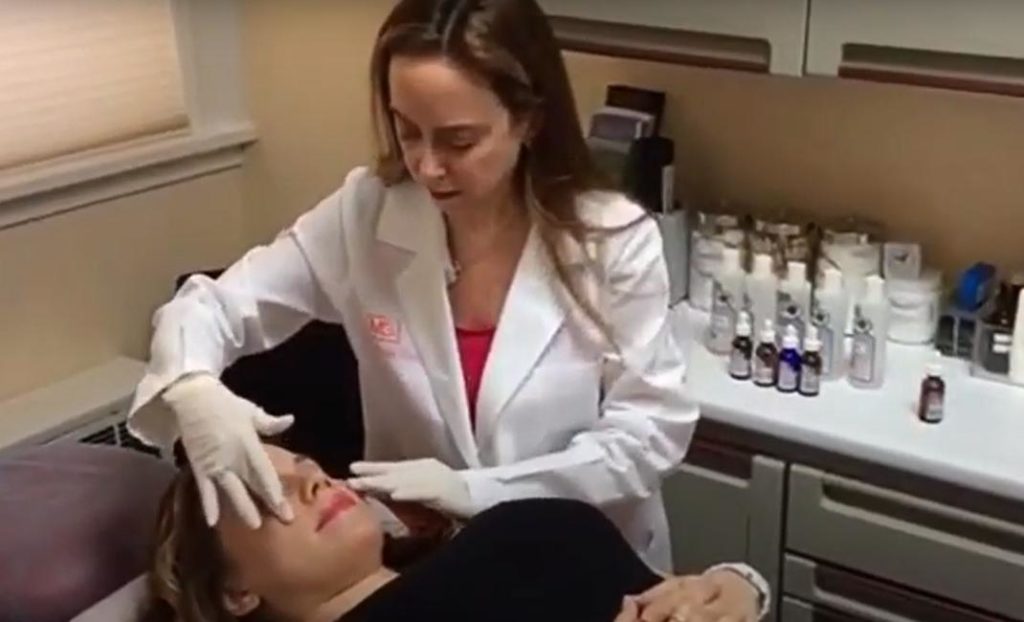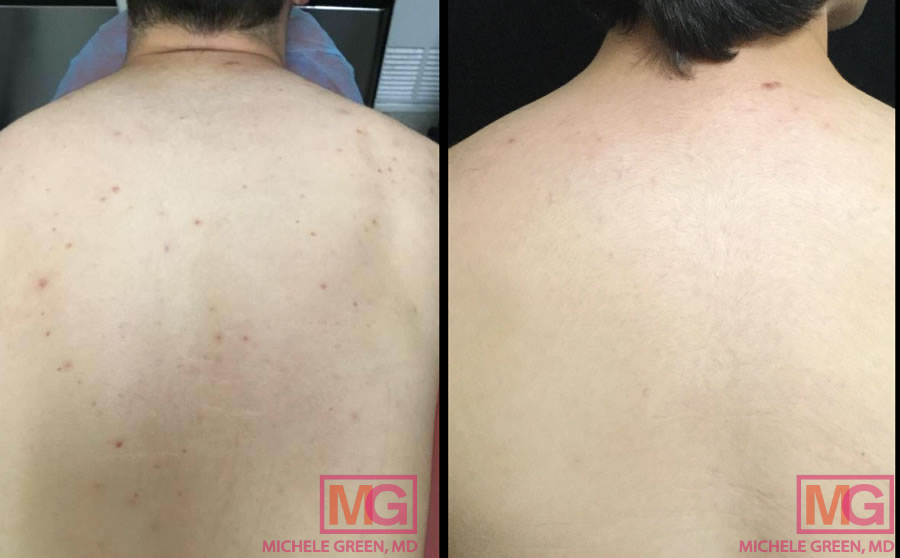Does birth control help acne?
Acne – pimples, blemishes, spots, breakouts – the skin condition that tends to start during puberty and can, unfortunately, continue to plague you well beyond your teenage years. These blemishes, characterized by red spots that appear most frequently on your forehead, chin, upper back, chest, and arms, can make you feel self-conscious, even though the condition is extremely common. Over 50 million Americans suffer from acne and for many women, pimples can strike whenever there is a hormonal shift in your body. Beyond puberty, this can mean breakouts the week before your period as well as during your period, making acne a source of stress for a significant portion of each month.
Birth control comes in a variety of forms and while the primary use is to prevent pregnancy, a benefit of several forms of hormonal birth control is the prevention and treatment of acne. These hormonal birth control methods, including the birth control pill and the patch, contain estrogen and progesterone, which help to suppress the androgen hormones that cause acne flareups. Birth control is a simple way to cure acne and can replace or be paired with other treatment methods depending on the severity of your acne. Some birth control pills are even approved by the FDA (Food and Drug Administration) as recognized acne treatments. If you are suffering from acne, consult with an expert dermatologist, such as Dr. Michele Green, to see if starting birth control is right to treat your acne.
Dr. Michele Green is a board certified cosmetic dermatologist, and has been providing effective acne treatments for her patients at her Upper East Side office for more than 25 years. Whether it is acne prevention, acne treatments, cosmetic lasers, chemical peels, facials, or injectables, Dr. Green is consistently voted as one of the best dermatologists in New York by Castle Connolly, the New York Times, New York Magazine, and Super Doctors. If you are suffering from acne breakouts, Dr. Green is here to help.
What is acne vulgaris?
Acne vulgaris is the scientific name for the skin problem commonly just known as acne or colloquially called pimples, spots, or blemishes. The condition is characterized by spots on your skin that can appear on your face, upper back, chest, or arms. These blemishes arise when there is an excess of oil (called sebum) on your skin, which can clog the hair follicles in the oily areas of your body. When your pores are clogged only with sebum and dead skin cells, this is called noninflammatory acne, or comedones, which can manifest as whiteheads (when the lesion is open to the surface of the skin) or blackheads (when the lesion is closed). If bacteria gets into the clogged pores, it can cause an infection, which leads to inflammatory acne. Inflammatory acne can appear as pustules, which contain pus, or papules, which do not. Cystic acne is another kind of acne that occurs when cysts develop below the surface of the skin. When the cysts are infected with bacteria, they become swollen, red, and often painful.
What causes acne?
Acne occurs when the hair follicles on your skin are clogged with oil (called sebum) and dead skin cells, and can be made worse when bacteria is present in the lesion. The sebaceous glands, which produce sebum, can be triggered to produce excess sebum when there are shifts in the hormone levels in your body. When levels of androgens, such as testosterone, increase, it triggers the activation of the sebaceous glands and more sebum is produced. Puberty is often the first time that many people experience breakouts of acne due to the shifting hormones during that time. However, most women experience shifts in hormone levels every month as a result of menstrual cycles. This adult acne is extremely common and a study done by the American Academy of Dermatology found that approximately half of all women in their 20s and a third of all women in their 30s experience acne breakouts. If your acne is triggered by shifts in hormones, you may experience breakouts in the week leading up to your period and throughout the duration of your period before the levels of androgens return to normal.

Can birth control help with acne?
Yes! When patients ask, which birth control helps acne, the answer is that hormonal birth control that contains estrogen and progestin (a manmade form of the hormone progesterone) in combination can work to treat and prevent acne. This combination birth control pill has been clinically proven to be effective in reducing acne and there are four types of birth control pill that have been FDA approved specifically for the treatment of acne. The birth control patch has also been shown to reduce and prevent acne. Research has shown that birth control pills are effective in treating all types of acne, including noninflammatory acne such as blackheads and whiteheads, as well as inflammatory and cystic acne. Taking combination birth control pills can control breakouts as well as reduce the severity of flareups and inflammation.
Why does birth control help hormonal acne?
Combination birth control contains the hormone estrogen and the synthetic progestin, which is a form of the sex hormone progesterone. When these hormones are combined, they reduce the amount of androgens like testosterone, which are responsible for the over-production of sebum. By balancing out the testosterone, the estrogen and progestin present in the birth control keeps androgens from triggering the sebaceous glands, which, in turn, reduces the likelihood that the pores will be clogged with excess oil.
What are the different types of birth control?
There are many different types of birth control available that are effective at preventing pregnancy and some are also very effective in treating and preventing acne outbreaks. The kinds of birth control available include:
- Combination birth control pills (hormonal birth control containing estrogen and progestin)
- Mini-pills (hormonal birth control containing only progesterone)
- The patch (hormonal birth control containing estrogen and progestin)
- Implants such as Nexplanon (hormonal birth control)
- Hormonal IUDs such as Mirena, Liletta, Kyleena, and Skyla (Intra-uterine device containing hormones)
- Copper IUDs (intra-uterine device that does not contain hormones)
- NuvaRing (Contains hormones)
Do birth control pills help with acne?
There are two types of birth control pills, also known as oral contraceptives: combination pills and mini-pills. Combination pills contain both estrogen and progestin and with these two hormones working together, acne breakouts can be reduced or eliminated. There are a wide variety of birth control pills and the effectiveness of the pill at reducing acne has to do with the kind of progestin contained in the pill. Drospirenone for example, which is the type of progestin that is found in the birth control pill called Yaz, has been shown to be the most effective at helping with acne. The other type of birth control pill is called a mini-pill because it only contains progesterone (not estrogen). Mini-pills are not effective in preventing acne and can, in fact, result in an increase in acne breakouts as a side effect.
Which birth control pills are FDA approved to treat hormonal acne?
There are four birth control pills that have received approval by the FDA to specifically treat acne. This means that they have been shown to be so effective at treating and preventing acne that the US Food and Drug Administration has approved the pill to be specifically prescribed to treat acne. All four use a combination of the hormone estrogen in the form of ethinyl estradiol and progesterone in the form of progestin. Those four birth control bills are as follows:
Yaz – A combination birth control pill that contains estrogen in the form of ethinyl estradiol and progestin in the form of drospirenone. Drospirenone has been shown to be the most effective progestin to prevent acne.
Ortho Tri-Cyclen – A combination birth control pill that contains estrogen in the form of ethinyl estradiol and progestin in the form of norgestimate. Ortho Tri-Cyclen can be available at different levels of progestin.
Beyaz – A combination birth control pill that contains estrogen in the form of ethinyl estradiol and progestin in the form of drospirenone. This is the most recently FDA approved birth control pill for treating acne.
Estrostep FE – A combination birth control pill that contains estrogen in the form of ethinyl estradiol and progestin in the form of norethindrone. Estrostep FE can have the level of estrogen adjusted.
There are other birth control pills that have been clinically proven to improve acne but have not yet been FDA approved including Yasmi and Alesse.
Does Yaz birth control help acne?
Yes! Yaz birth control pill is a combination pill that contains both the hormone estrogen and a manmade form of the hormone progesterone, called progestin. These hormones working in combination work to suppress the androgen hormones that cause the overproduction of sebum. Yaz is one of the four FDA approved birth control pills to treat acne. When you have your consultation with Dr. Green, Yaz is one of the birth control options that are available to you to treat acne. Yaz can also be used in combination with other acne treatments such has topical acne creams. When you are prescribed your treatment plan, be sure to take you Yaz pill at the same time each day and continue with any other prescribed acne treatments.
Does the birth control shot help acne?
No. While the birth control shot is a safe and effective way to prevent pregnancy, it is not been proven to improve acne breakouts. The birth control shot is 94% effective in stopping pregnancy from occurring and has other benefits such as reducing the cramps and heavy menstruation. If painful and heavy periods are something that you suffer from, the birth control shot is a type of birth control worth considering. However, if you are looking to get on birth control to help control your acne, the birth control shot is not the place to start. Other hormonal birth control such as oral contraception and the birth control patch are more helpful in that regard.

Does the birth control patch help with acne?
Yes! The patch is a form of birth control in which you stick a patch on certain parts of your body that releases a combination of the estrogen and progesterone hormones. The estrogen and progesterone work together to keep your ovaries from releasing eggs and to also prevent the over activation of the sebaceous glands. This combination of hormones in the patch works much the same way as the combination birth control pills though the patch is not yet FDA approved to treat acne. There are two brands of the patch that work to prevent acne: Xulane and Twirla. To use this form of birth control, you will stick a patch to a clean and dry part of your skin on your buttocks, stomach, or back.
How long does birth control take to help acne?
The hormones in birth control lower the hormone levels of androgen hormones, which contribute to acne. As such, it can take your body some time to adjust to the hormonal shift so your acne will likely not clear up immediately once you begin taking birth control. Most patients see the effects of the birth control on their acne in two to three months though some patients see a reduction in acne in only a couple of weeks. Full effects of the treatment are typically seen around six months after you begin taking the birth control. When you meet with Dr. Green, she may prescribe topical acne creams in addition to the birth control for the first couple months after you start your birth control treatment.
Can the birth control pill cause acne?
It is very important to differentiate between the two different kinds of birth control: combination birth control pills are different in make up than mini-pills. Where combination birth control pills use both estrogen and progesterone, mini-pills only contain progesterone. For that reason, mini-pills are not effective in treating acne. It is the estrogen in the pills that largely helps to offset the testosterone in the body. Not only do progesterone-only pills not treat acne, they can actually cause acne as a side effect of the pill.
This is another reason why it is important to consult with an experienced dermatologist, such as Dr. Green, before going on the pill so you are being prescribed a pill that actively help your acne. The birth control shot is another form of birth control that uses only progesterone and therefore does not help with acne. There is also one combination birth control pill that can cause acne as a side effect of the pill and that is Lo Loestrin. Lo Loestrin contains norethindrone acetate, which can lead to breakouts.
Does birth control help cystic acne?
Yes! Birth control is a great treatment option if you are looking to eliminate cystic acne. Cystic acne occurs when the hair follicles get clogged with sebum, dead skin cells, and bacteria, forming an acne cyst under the skin. The infected cyst can become red, swollen, and very painful. The cysts can also contain pus and should not be popped, for the risk that the pus could spread the infection. It is imperative to consult a dermatologist, such as Dr. Green, to receive treatment for cystic acne in order to prevent scarring. Combination hormonal birth control pills work to combat all kinds of acne – cystic acne included.
Does birth control help with back acne?
Yes! Combination hormonal birth control such as the birth control pill and the birth control patch both work to eliminate all types of acne across all locations on the body. In addition to the face, the back is another common location for people to develop acne. There is a high concentration of sebaceous glands on the upper back, meaning that when the body produces excess sebum, the upper back is likely to be affected. When Dr. Green prescribes birth control pills for the acne on your back, the combination of hormones will prevent the androgen hormones from triggering increased sebum production.

Accutane treatment for acne on the back – before and after
Who can take birth control for acne?
Birth control pills can be a great option for patients who are looking to treat and/or prevent acne. It is a long lasting solution that is effective and safe for most people. In order to take birth control pills, you must have have through puberty such that you are regularly menstruating. As you are preparing for your consultation appointment with Dr. Green, it is important to disclose to her certain medical information before she can prescribe birth control as acne treatment. If you suffer from high blood pressure or have a history of blood clots, chronic migraines, cancer, or heart disease, it may be dangerous for you to take birth control pills. Be sure to also disclose to your healthcare professional, Dr. Green, any medications that you are taking or surgeries you have had. If you are over the age of 35 and a smoker, birth control pills may also be unsafe. Disclosing this information will help to keep you safe as you embark on your treatment and ensure that Dr. Green can provide you with the best medical advice for your acne treatment plan.
What are the side effects of the birth control pill?
There are some common side effects for the birth control pill including weight gain, nausea, breast tenderness, lighter periods, and spotting between periods. These side effects are common and should not be dangerous to your health. Certain symptoms could be an indication of more serious side effects such as shortness of breath and chest pain. If you are experiencing these symptoms, it could be a sign of a heart attack. Some patients may be at risk for developing gallbladder or liver disease as a result of taking birth control pills. Severe side effects can be avoided if you disclose your medical information to Dr. Green during your initial consultation.
How do I get started with birth control to treat acne?
If you are struggling with acne breakouts, expert, board-certified dermatologist, Dr. Michele Green is here to help design the best treatment plan for you. Whether the acne breakouts are hormonal or genetic, Dr. Green will assess the specifics of your particular type of acne and customize an effective acne treatment for you. With over two decades of experience in cosmetic dermatology, Dr. Green will help you clear up your acne and prevent acne scarring. Please contact us online or call 212-535-3088 to learn more about about safe and effective treatment for acne.
 212-535-3088
212-535-3088